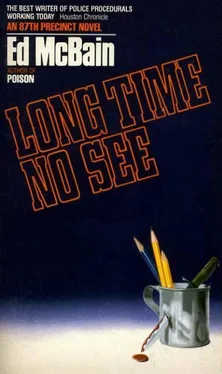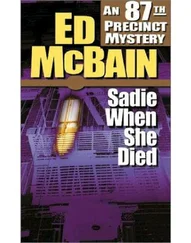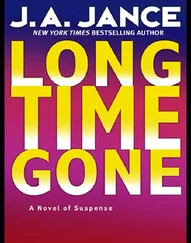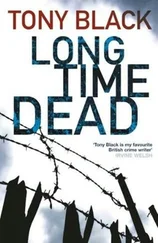The General Hospital at Fort Mercer was built just before the Spanish-American War. Carella was so informed by the WAC sergeant who was leading him to the room where the records were kept. He had no reason to doubt her word; the place looked turn-of-the-century, with high vaulted ceilings and thick walls, windows that rose from the floor to twice a man’s height. They had taken the elevator down from Colonel Anderson’s office and were walking through a ground-level corridor that resembled a colonnade running along one side of a cloister. Beyond the windows was a bloomless garden and a lawn that rolled in hillock after hillock to the River Harb below. In the distance, on a point of land jutting out from the shore, Carella could see the gray walls of Castleview State Penitentiary. He knew a lot of people in that prison, all of them convicted felons. They had been, so to speak, business associates.
The sergeant was an attractive blonde — in her early thirties, he guessed — wearing her olive-drab uniform with all the authority of a fashion model, low heels clicking rhythmically on the tiled floor of the corridor, hips swaying, blue eyes catching the flat November light and reflecting it.
“Makes you think they were expecting the damn war, doesn’t it?” she said. “Otherwise, why would they have built two hospitals here? You know what they call this one, don’t you?”
“Yes. General Hospital.”
“Do you know the joke?”
“No, what joke is that?”
“Is there one for the enlisted men?”
Carella looked at her.
“The enlisted men,” she said.
“Oh. General Hospital.”
“Right, you’ve got it,” she said, and laughed. Carella suddenly wondered if she was flirting. He decided she wasn't. But maybe she was. No, he decided she wasn’t.
“Here we are,” she said, and stepped swiftly to a massive wooden door on the right-hand side of the corridor, and opened it.
Carella followed her into a huge room crammed with metal filing cabinets. Again there were vaulted ceilings and tall windows streaming light. The cabinets were arranged in rows, like cemetery markers, stretching from the door to the farthest end of the room. The task of finding James Harris’ medical history in this room that echoed filing cabinets suddenly seemed overwhelming. Not five minutes ago Colonel Anderson had told him the sergeant would help him locate whatever he needed. Now Carella wondered if anything less than a full platoon could manage the job. His dismay must have showed on his face.
“Don’t let it scare you,” she said. “It’s really pretty well organized. We’ll find the file in a jiffy, and then I’ll help you wade through it. Do I call you Detective Carella or Mr. Carella, or what?”
“What do I call you?” he said.
“Janet.”
“Steve.”
“Hi.”
“Hi.”
They might have had trouble finding the file in the jiffy Janet had promised, if it weren’t for James Harris’ middle name. Over the years since the hospital was built, no fewer than forty-seven James Harrises had passed this way, the victims of no fewer than four wars; it had been a busy time for America. But only two of the wounded soldiers were named James Randolph Harris, and one of them was white and the other was black, so that ended the five-minute search. The folder was thicker than the search had been, if girth could be measured against minutes like apples against oranges.
Janet led Carella to another wooden door and then through it into an adjoining smaller room that seemed almost monastic — severe white walls, small windows, a simple wooden table with high-backed chairs around it. He realized all at once that many of his references today were ecclesiastical in nature: the squadroom resembling a cathedral, the corridor a cloister, and now a room he equated with a monastery cell. He all but expected a tonsured man in a brown hooded habit to come through the other door carrying a manuscript to be illuminated.
“This is my favorite place in the entire hospital,” Janet said, and pulled a chair from the table, and sat.
“How shall we work this?” he asked.
“Depends on what you’re looking for,” she said, and crossed her legs. She had good legs. He wondered again if she was flirting. And decided she wasn’t.
“I’m looking for anything that mentions the nightmares Harris was having.”
“Okay,” she said. “Let’s split the file. You work forward from the back, I’ll work toward the middle from the front. How does that sound?”
“Fine,” Carella said.
“Has anyone ever told you your eyes slant downward?” Janet said.
“Yes.”
“They do.”
“I know.”
“Mm,” she said, and nodded, and smiled briefly.
“Well,” he said, “let’s get to work. I really appreciate your helping me this way.”
“Orders is orders,” she said, and smiled again.
They worked in silence, sampling the file as they might have vintage wine — tasting, discarding, tasting again, cup by cup. page by page. It was Janet who came across the first mention of the nightmares.
“Here’s something,” she said.
The something was a memo from a Major Ralph Lemarre to Lieutenant Colonel Paul Konigsberg regarding a dream related to the major by Pfc. James Randolph Harris.
It is shortly before Christmas.
Jimmy’s mother and father are decorating a Christmas tree. Jimmy and four other boys are sitting on the living-room floor, watching. Jimmy’s father tells the boys they must help him decorate the tree. The boys refuse. Jimmy’s mother says they don’t have to help if they’re tired. Christmas ornaments begin falling from the tree, crashing to the floor, making loud noises that startle Jimmy’s father. He loses his balance on the ladder and falls to the floor, landing on the shards of the broken Christmas tree ornaments and accidentally cut - ting himself. The carpet is green, his blood seeps into it. He bleeds to death on the carpet. Jimmy’s mother is crying. She lifts her skirt to reveal a penis .
“What do you make of it?” Janet asked.
“I can’t even figure out my own dreams,” Carella said. “Let’s see what Major Lemarre thinks.”
The major thought little or nothing at this point. This was the first time the dream had been related to him, and there was no indication in his memo that he believed it would become a recurring nightmare. His only comment related to information he had gleaned from previous interviews with Jimmy. The boy’s father had been killed in an automobile accident when Jimmy was six, and his mother had taken on the responsibility of raising the family alone. Major Lemarre speculated that the part of the dream attributing male sex organs to a female might have had something to do with Sophie Harris becoming both mother and father to young Jimmy.
“Well,” Janet said, and shrugged. It was clear that the interpretation of dreams left her cold.
Carella understood her position. He had grown up in a family where dreams were thought of as omens of events to come. If you dreamt that seven men were carrying eight bales of cotton up four steps, then you had best run to your local bookie and bet 784 for that day’s number. If you dreamt that Aunt Clara fell off the roof, it would be a good idea to contact your neighborhood mortician or at least reserve a room at the nearest hospital. Nobody in Carella’s family thought of dreams as clues to personality or behavior. It was only when he joined the police force, or more specifically when he became a detective, that he began to think of dreams in a different way. It was a police psychiatrist who told him that a recurring dream could be thought of as a dimly lighted tunnel to the past. The patient and the analyst, working together, could illuminate that tunnel, reconstruct whatever trauma was causing the persistent dream, and thereby free the patient to deal with it on a realistic level rather than a fixated one. None of which made too much sense to Carella at the time.
Читать дальше












